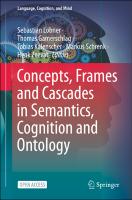Concepts, Frames and Cascades in Semantics, Cognition and Ontology
Contributor(s)
Löbner, Sebastian (editor)
Gamerschlag, Thomas (editor)
Kalenscher, Tobias (editor)
Schrenk, Markus (editor)
Zeevat, Henk (editor)
Language
EnglishAbstract
This open access book presents novel theoretical, empirical and experimental work exploring the nature of mental representations that support natural language production and understanding, and other manifestations of cognition. One fundamental question raised in the text is whether requisite knowledge structures can be adequately modeled by means of a uniform representational format, and if so, what exactly is its nature. Frames are a key topic covered which have had a strong impact on the exploration of knowledge representations in artificial intelligence, psychology and linguistics; cascades are a novel development in frame theory. Other key subject areas explored are: concepts and categorization, the experimental investigation of mental representation, as well as cognitive analysis in semantics. This book is of interest to students, researchers, and professionals working on cognition in the fields of linguistics, philosophy, and psychology.
Keywords
Cognitive Linguistics; Philosophy of Mind; Experimental Psychology; Psycholinguistics and Cognitive Lingusitics; Representation of Concepts; Lexical Semantics; Frame Semantics; Frame Representations; Conceptual Spaces; Categorization and Linguistics; Open Access; Linguistics; Cognitive studiesDOI
10.1007/978-3-030-50200-3ISBN
9783030502003, 9783030502003Publisher
Springer NaturePublisher website
https://www.springernature.com/gp/products/booksPublication date and place
2021Imprint
SpringerSeries
Language, Cognition, and Mind, 7Classification
Linguistics
Philosophy of mind
Experimental psychology


 Download
Download Web Shop
Web Shop